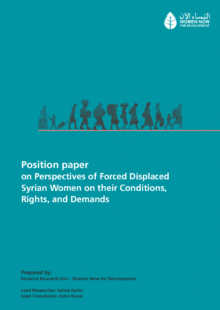Thousands of Syrian women, along with their family members, have been forcibly displaced from their homes as part of a process called “reconciliation agreements”. Most were taken to unknown and unsafe locations in other parts of Syria. On last Wednesday 28 April a group of Syrian forcibly displaced women (FDS) launched a position paper reflecting their conditions, rights and demands. The position paper is the result of a project that PAX partner Women Now for Development has been working on over the past 2 years and that brought together and trained a group of women who survived sieges and forced displacement. The paper is available in English and Arabic.
Forcibly displaced Syrian women were subjected to a variety of human rights violations before their displacement; including living under siege for years with constant bombardment, starvation, deprivation of access to educational facilities, denial of medical care and services, access to food, hygiene, clothing, or any other basic materials.
Currently, FDS women live in extremely challenging situations; most FDS women are severely traumatized and lack psychological, health, economic, legal, educational, or community support. They have lost their support circles, beloved ones, homes, social and political roles, and jobs:
- With the absence of the utilization of any international mechanism or process to hold the Syrian regime accountable, women who have been displaced to opposition areas in Syria cannot return to their original areas and homes. Some face imprisonment by Syrian regime security forces for their political and humanitarian involvement, or a number of other reasons. Others have no houses to go back to as their homes are occupied by other people or destroyed. Besides, many women cannot prove the ownership of their property because they lack official documents; the discriminative local laws make it harder for them to prove or transfer the right of property ownership after the death or disappearance of the men in their families. In addition, there are new oppressive and discriminatory laws by the Syrian regime related to properties’ ownership.
- Many FDS Women in Syria, Turkey, and Lebanon have no official papers. The lack of official identification papers constrains their movements, as well as their access to health or educational services. Moreover, it puts them at risk of being deported to Syria or detained in Turkey or Lebanon. Besides, the irregular situation of many FDS Women, makes them vulnerable to sexual harassment and other types of abuse.
- Many women are subject to SGBV . They face it in their everyday tasks, such as renting apartments, looking for jobs or searching for health services, and so on.
- Most of the FDS Women lost their social networks and circles. Being in new environments and communities without any support is affecting negatively their ability to integrate and communicate with the new host communities.
- FDS Women express frustrations of not finding job opportunities that meet their experiences, especially women who used to work with the civil societies under siege. They are shocked with the required qualifications and skills inside Syria (opposition areas) or in Turkey which they did not need in the siege to do similar jobs. For instance, writing CV’s, English skills, advanced computer skills. This makes them feel unqualified and in need of additional job training.
- Most of the FDS Women lack the knowledge, support, and tools related to how to advocate for their legal situations and rights on an international and local level. The lack of support for women increases the absence of women from any access to local and international platforms related to justice and accountability processes for their cause and rights.
This paper aims to highlight the situation of forcibly displaced Syrian women (FDS Women) to stress the urgent need for serious, sustained, contextualized, and gender-sensitive support, solidarity, and responses with them and their communities. It also seeks to underline that FDS women are subjected to many human rights violations and crimes (especially siege and forced displacement) and to reiterate the ongoing impunity of perpetrators in Syria. It highlights the lack of justice in the Syrian scene in general and for marginalized groups across multiple levels (including rights such as remuneration, political status, economic situation, health situation, and right of return) in particular.
The launch event of our position paper was recorded online, you might watch it in English or in Arabic on YouTub





